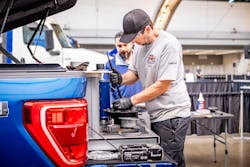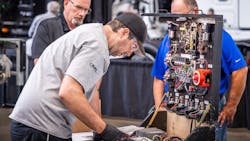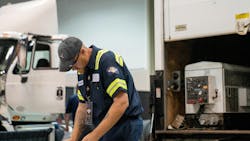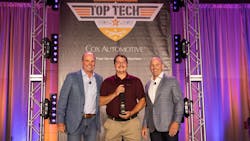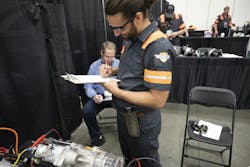Winning personalities: Top techs share secrets to their success
A common complaint in commercial vehicle shops is that good help is hard to find. And while there's no "one-size-fits-all" template for a quality technician, there are a few traits shop managers should look for.
To help you identify what those are, we spoke to some of the best of the best, as proven by their recent triumphs in company-held diesel tech skills competitions.
Work ethic and taking on the toughest jobs
First up is Warren Smith, the Technician in Charge at Ryder Ontario, Canada, who won the 2024 Ryder Top Tech Competition in August. He outperformed ten other finalists and over 1,200 other Ryder technicians participating in the internal competition to claim the $50,000 prize and title of Top Technician at the logistics and maintenance provider. Ryder has 4,800 techs in total and services around 250,000 commercial vehicles.
"I think what ultimately gave me the edge is my strong work ethic," Smith said on what helped him win. "I usually go into the shop early most days to train, read OEM literature, catch up on anything new on Ryder's Infocenter, and also read over TAC cases to see what other shops/techs are having issues with. I also do dedicate time in my personal time to conduct training at home."
To ensure that work ethic doesn’t atrophy, managers can help themselves by instilling a good shop culture that fosters teamwork and collaboration.
"At the Ryder shop in Ontario, we have a strong support system and a healthy workplace dynamic, where we are always helping each other learn and pushing each other to do better," Smith explained.
Smith said working on new things keeps him motivated, and though electrical and diagnostics are a problem area for many techs, he believes them to be his area of expertise.
"Each and every problem can be something new and challenging," he said. "It keeps me interested and my mind engaged."
Ryder also enhances Smith’s inherent aptitude with its proprietary Service Bay Tool, which Smith said “has all our OEM software to help diagnose, test, and monitor all the complex systems in our units.”
Experience and curiosity
Cox Automotive, one of the country's leading mobile maintenance providers, also has a Top Tech competition open to their 1,500 technicians
For the 2024 contest held earlier this summer, Michael Kerfoot took first place in the heavy-duty category of the internal skills competition. Last year he won the trailer track, making him the first Cox tech to become champion of both sides, the company said.
Kerfoot, who previously worked for TravelCenters of America where he got both shop and emergency roadside experience, regularly finishes near the top of the industry's national competition, TMCSuperTech, as well. He came in 2nd place the last two years in the trailer division, and 3rd overall in 2021.
See also: Cox Automotive puts focus on mobile maintenance | Fleet Maintenance
The WyoTech graduate who worked in auto repair emphasized the importance of building a basic skill set in multiple areas of repair, especially when taking maintenance outside of the shop.
"If you want to do road service or mobile maintenance of any kind, you really do need to be more rounded, and at least understand a little bit of everything," said Kerfoot, who is based out of San Antonio.
He said he doesn't specifically study for the various competitions and "just shows up," but that's more of a testament to his experience and knowledge he picks up fixing customer equipment. He began working on engines in high school, though it was only a small engine program where he fixed lawnmowers for the community.
Even before that, he was always curious about the mechanics of things.
"When I was a kid, I was working with my hands and always tearing something apart," Kerfoot said. "Not always getting it put back together in working format, but tearing stuff apart."
The savvy vet also knows what to do when he doesn't know about a certain fault code (even the best can't memorize them all), turning to his Mitchell 1 software, Google, and his wide network of colleagues.
"You've got basic electrical skills that you can apply to any electrical issue," he explained, "but if you can't find the problem with those then obviously you have to go and pull up specific troubleshooting information."
Kerfoot does have an unfair advantage against most other techs, as his mother was a high school chemistry teacher, and the core of diagnosing any root cause comes down to the scientific method. They also did plenty of mother-son bonding blowing stuff up during experiments.
He then would naturally go off and experiment on his own, which led to a little friction.
"I got in less trouble for blowing the things up than I did for not inviting her before I got to blow the stuff up," he joked.
Knowing how to pick up new skills
Being well-rounded is another important attribute. Next-level technicians like Dillon Grimes, a Cox technician and 2024 Top Tech first-place winner in the trailer category, had already picked up several other skills prior to turning wrenches.
He started as a parts delivery driver for a trailer company and ended up climbing the ranks until he was working within the shop as a parts manager, which ultimately led to his work as a technician.
This background and hands-on knowledge proved invaluable.
“I feel that running parts really helped broaden knowing how everything's built, inside and out, on the diagram and in person, when I became a technician,” he said.
Grimes was used to picking up new skills fast to ascend the ranks and takes a similar approach to acquiring new skills through a typical day of repair.
He said the Cox competition helped him hone those skills.
“I actually try to incorporate my day-to-day work into the competition," Grimes said. “I look up a lot of manuals to gather a lot of knowledge and do it out in the field and practice, make it like secondhand nature,” he suggested. “Then, whenever you get up there to the competition, you're like, ‘I've done this. It's nothing different.’”
When it comes to learning something new, Grimes emphasized that the best resource is usually OEM-provided literature.
“All your manufacturers out there, especially on the trailer side, give you a troubleshooting, maintenance, installation guide, etc. Let's say it's an issue that there is no documentation for, if you can't find it on the troubleshooting or the maintenance side, you go back to the installation and try to figure out what step it would be,” he said. “You can use all three manuals to your benefit.”
Jose Feliciano, Cox Top Tech second-place winner in the heavy-duty category, uses a combination of reading and videos. He explained that if something is right in front of him, then reading will do the trick, but sometimes switching to video is the best way to stay engaged.
Feliciano, a Top Tech champion or runner-up for seven consecutive years and regular TMCSuperTech challenger, clarified that even if he watches a video, until he is able to get hands-on with the repair, it’s not really learned.
“You can tell me it's done this way, but until I put my hands on and learn from the experience, that's when I actually learn it 100%,” he concluded.
Feliciano also did extra-curricular studying on Cox’s automotive side so he could work on his own personal vehicles.
Adapting to change
While a comprehensive work history and desire to learn is an excellent start, the future is ever-evolving. No amount of background knowledge is adequate preparation for innovation and new technology. A next-level technician is always looking ahead.
In the beginning, it took a bit of effort to get the basics down and gain his footing, Feliciano said. But even once he was confident in his abilities, he explained that the work never truly stops.
“Even if it's the same system that you've been working on, something new will come up and you have to keep learning about it, looking for information day-to-day,” he emphasized. “And don't shy away from saying, ‘Hey, I don't know this system. I’ve never encountered this issue,’ and just find a solution.”
Kerfoot, who has been competing at the national level for almost a decade, echoed this sentiment.
“Everything changes every year. They add new emissions regulations—we started off with EGR on diesels, and then they went to the DPF, and then the DEF,” he noted. “So it's always changing, it's always evolving. And you just have to do what you can to try to keep up with it.”
And with impending EPA regulations set to shake things up in 2027, adaptability is going to be key.
About the Author

Lucas Roberto
Lucas Roberto is an Associate Editor for Fleet Maintenance magazine. He has written and produced multimedia content over the past few years and is a newcomer to the commercial vehicle industry. He holds a bachelor's in media production and a master's in communication from High Point University in North Carolina.
